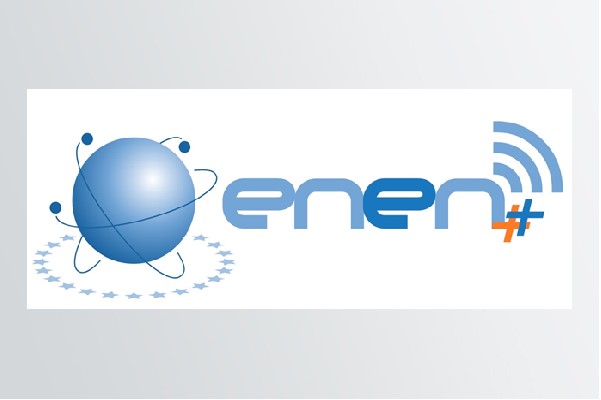In the frame of the project INSC T&T Project MC3.01/20, funded by the European Union,
2 courses are open for experts of the National Nuclear Regulatory Authorities and their Technical Support Organisations for developing and strengthening their regulatory and technical capabilities.
The European Union supports the promotion of the effective nuclear safety and radiation protection culture, the safe management of spent nuclear fuels and radioactive wastes and the safeguards of nuclear materials, and the implementation of the highest related standards in third countries. This objective is achieved through the European Instrument for International Nuclear Safety Cooperation (INSC).
INSC includes a Training Tutoring initiative that involves transferring knowledge, EU expertise and best practices for countries needing technical assistance.
The initiative aims at assisting the National Nuclear Regulatory Authorities and Technical Support Organisations of non-EU countries in strengthening their capabilities in relation to their regulatory responsibilities and functions
APPLICATION INSTRUCTIONS can be found HERE
BROCHURE can be downloaded HERE
Field: RADIATION PROTECTION AND WASTE MANAGEMENT
Topic: REGULATION OF RADIATION PROTECTION IN MEDICAL APPLICATIONS
Date: 3-7 October 2022
Duration: One week
Location: Novi Sad, Serbia
Working language of the course: English
Objective and learning outcomes
This course provides trainees with basic knowledge and skills in radiation protection for the different radiation fields of medical applications (radiotherapy, nuclear medicine and radiology), protection of healthcare staff and patients and thereby ensuring the increase in competencies required for inspection and review tasks.
Outline of course content
Interpretation of the international (e.g. IAEA) and European Union regulation on radiation protection.
International guidance and national solutions for the dose limitations of medical staff members as part of the occupational dose control system. Exclusive nature of patient doses: perception of individual risk, responsibility of medical staff (medical physicists, physicians, radiation therapy technologists) in determining dose target values – DRL. Interpretation of public dose constraints for medical facilities.
Nuclear measurements techniques in medical application and personal dosimetry.
Radiation protection of medical staff. Planning of protective actions, shielding, and applications of remotely controlled equipment. Regulatory inspection of radiation sources and radiation protection methods in medical facilities. Role of radiation protection officers (RPOs) and radiation protection experts (RPEs), qualified medical physicist (QMP) and medical physics expert (MPE) at medical facilities.
Introduction the modern technologies used in radiotherapy, nuclear medicine and radiology.
Nuclear medicine – Production of radiopharmaceutical and medical materials in irradiation facilities and isotope laboratories. D-values in medical applications, transportation, applications (SPECT, PET, therapy), waste management.
Diagnostic Radiology – protection of the member of staff, patient and workers, caregivers for the different fields (mammography, computer tomography, interventional radiology, dental, etc).
Radiation Therapy – protection of patient and staff (external therapy and brachytherapy, proton therapy)
Visit to a major medical facility providing various diagnostic and therapeutically services to patients with radioactive material and ionization radiation. Introduction of local documentation and record keeping, methods for dose exposure determination of medical staff, patients, careers and comforters. Measurement procedures and equipment.
Technical schedule and delivery methods
The course consists of one module taking a working week (i.e. 5 workdays).
Classroom lectures take 4 days with 4 units per day (tentatively morning sessions with 2 lectures of 90 minutes each, afternoon sessions with 2 lectures of 90 minutes each, with time allocated for discussions and appropriate breaks).
2 half-day technical visits to a major medical facility providing various diagnostic and therapeutically services to patients with radioactive material.
Prerequisites and requirements for participants
Participants should have a basic knowledge of radiation protection and an adequate level of knowledge of English.
Terms of participation
The project is implemented under the European Union (EU) external assistance programme called the European Instrument for International Nuclear Safety Cooperation (INSC) and aims to support the National Nuclear Regulatory Authorities (NRAs) and their Technical Support Organisations (TSOs) in non-EU countries in strengthening their capabilities with regard to their regulatory tasks and responsibilities in the field of nuclear safety and radiation protection.
Employees of the NRAs or their TSOs in the Beneficiary Countries are eligible for financially supported participation in the T&T courses. Beneficiary Countries of the project are published on the website https://training.ek-cer.hu/.
Costs
Travel costs and subsistence allowances (including the international and national travel tickets, per diems, shuttle services, insurance and visa costs) for participants will be covered by the project.
Application
Application via the website https://training.ek-cer.hu/, according to the process and deadlines indicated there.
Examination
Technical and linguistic tests will be written as part of the application and selection process to assess the underlying knowledge and preparedness of applicants. Knowledge and development of selected participants will be assessed through technical tests throughout the course.
Participants attending the full course will be issued attendance certificates. Successful participants will receive certificates confirming their knowledge achieved and skills acquired.
COURSE FLYER available for download HERE
Field: EMERGENCY PREPAREDNESS AND RESPONSE
Topic: INSPECTING OF EMERGENCY PREPAREDNESS
Date: 19-23 September 2022
Duration: One week
Location: Budapest, Hungary
Working language of the course: English
Objective and learning outcomes
Participants will become familiar with the aspects of regulatory inspection of the emergency preparedness and response (EPR) plans, the harmonization of plans and preparedness on national, organizational, local and facility levels. Special emphasis will be put on the lessons learned from the Fukushima accident and the consequential “stress tests” in European nuclear power plants.
Outline of course content
Introduction of the internationally accepted emergency classification system: 5 emergency preparedness categories (EPC). Definitions of emergency classes: alerts, facility emergencies, site area emergencies, general emergencies. Structure of emergency planning, preparedness, and response system in countries with and without nuclear power reactors in the European Union. Roles and responsibilities of on-site emergency response organizations (EROs) of facilities of EPC I and II.
Potential dose consequences of major nuclear emergencies with significant radioactive release into the environment. Legislative issues: reference levels for emergency responders and the public, conditions for designation emergency workers and responders. Fundamentals of dose control of the public under accidents conditions: system of reference level, generic criteria, and operational intervention levels (OILs). Applicability of projected doses and received doses.
Main goals of inspection of the emergency preparedness plans of nuclear installations and other stakeholders. Description and applicability of procedures for event identification and classification by means of pre-defined observables and emergency action levels (EALs) under all possible conditions; deduction and verification of EALs; definitions of worst credible accident for the given facility; time requirements of observing, classifying, and reporting all classes of emergency; procedure to activate the on-site ERO; record keeping during an emergency; dosimetric and radiation protection issues.
Inspection of cooperation of on-site EROs with pertinent national organizations for emergency response. Inspection of cooperation of on-site EROs with international organization related to nuclear emergencies: European Community Urgent Radiological Information Exchange (ECURIE), ENSEMBLE platform of the European Union and the IAEA Incident and Emergency Centre (IEC). Inspection of procedures for reporting and communications with pertinent national and international organizations; communication with other stakeholders (local authorities, medical services, police, media, etc.)
Account of the on-site ERO on their recent developments and improvements on their EPR plan as the result of recent targeted safety reviews (stress tests). Inspection of documents on recent trainings and exercises related to the EPR plan.
Tabletop exercise for evaluating the emergency preparedness report and the status of the EPR plan of a nuclear installation. The players form one or more groups of inspectors, the controllers play the role of the ERO of the facility under inspection. The ERO handles over a brief (1-2 pages) description on the recent real-time emergency exercise of the facility. The task of the players is to identify the weaknesses of the report: which key issues (if any) of the EPR plan were not covered, which tasks (if any) were solved erroneously in the exercise. Their findings will be discussed with the ERO to find and dedicate the improvements.
Technical visit is planned to the Centre for Emergency Response, Training and Analysis (CERTA) of the Hungarian Atomic Energy Authority (HAEA).
Technical schedule and delivery methods
The course consists of one module taking a working week (i.e. 5 workdays).
Classroom lectures take 4 days with 4 units per day (tentatively morning sessions with 2 lectures of 90 minutes each, afternoon sessions with 2 lectures of 90 minutes each, with time allocated for discussions and appropriate breaks).
A tabletop exercise will be included for which participants will form groups (4-5 persons each), and a 30-minute group discussion will be followed by a 45-minute exercise in two consecutive units.
Technical visit to the Centre for Emergency Response, Training and Analysis (CERTA) of the Hungarian Atomic Energy Authority (HAEA).
Prerequisites and requirements for participants
Participants should have a university degree obtained in engineering or physics faculties with nuclear specialization, at least 1-2 years of related experience, and an adequate level of knowledge in English.
Terms of participation
The project is implemented under the European Union (EU) external assistance programme called the European Instrument for International Nuclear Safety Cooperation (INSC) and aims to support the National Nuclear Regulatory Authorities (NRAs) and their Technical Support Organisations (TSOs) in non-EU countries in strengthening their capabilities with regard to their regulatory tasks and responsibilities in the field of nuclear safety and radiation protection.
Employees of the NRAs or their TSOs in the Beneficiary Countries are eligible for financially supported participation in the T&T courses. Beneficiary Countries of the project are published on the website https://training.ek-cer.hu/.
Costs
Travel costs and subsistence allowances (including the international and national travel tickets, per diems, shuttle services, insurance and visa costs) for participants will be covered by the project.
Application
Application via the website https://training.ek-cer.hu/, according to the process and deadlines indicated there.
Examination
Technical and linguistic tests will be written as part of the application and selection process to assess the underlying knowledge and preparedness of applicants. Knowledge and development of selected participants will be assessed through technical tests throughout the course.
Participants attending the full course will be issued attendance certificates. Successful participants will receive certificates confirming their knowledge achieved and skills acquired.
COURSE FLYER available for download HERE






